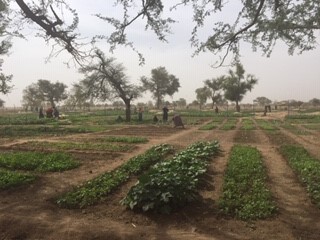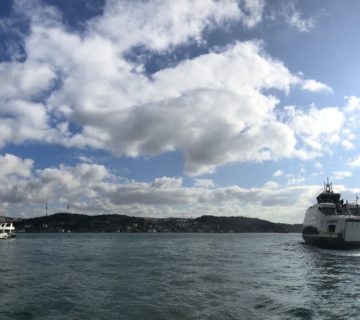in 2016, I traveled to Chad. One thing I remember: Chad is hot and dry. In the middle of this laregly underdeveloped country, with no high rises, basic infrastructure and simply built houses, are bakeries, a legacy that the former colonizers France left behind.
I travelled further to the northern parts. We took a plane and then traveled by car. Most villages are very road and you would sit for hours in a car without seeing a single village or person. This is the true sense of remoteness. After a few hours drive, we got out of our cars and sat down somewhere under a tree and waited for the village head to come and speak to us. We introduced each other and asked if we could also speak to some people here in the village to get a better understanding of their situation.
We sat down with three women, who looked very apathetic. They didn’t speak much and their sheer desperation was overwhelming. The women told us about how their men had left the village to seek jobs elsewhere mostly in the capital but also in other countries. They were left with their children and elderly in a hostile environment. There was nothing that people grew, no food and markets were far. They didn’t know what to do and told us how forgotten they felt.We gave them some food we had with us in the car. One woman fell down on her knees, praying that our coming was a sign of God, that he had not forgotten them.
The most food-insecure people often live in fragile and degraded landscapes and areas prone to recurrent natural shocks and other risks. As far as I could see, there was nothing but sandy soil, some trees and few market stalls. Nothing that people could really live on. We left the women and drove a few miles where I couldnt trust my eyes. The desert was literally turned green with a simple but effective strategy. Poeple planted vegetables and fruits for themselves, to sell and even for the children at school. How was this possible? Didnt we just see desperate women, with nothing to eat?
Organisations here use a simple concept: they pay people cash or given them food to address their immediate food needs. But then people are taught how to build damns, grow vegetables, construct roads or irrigation schemes. This will not only improve their lives immediately but also in the long term.
This change is transformative. Because these projects are long term, over several years, entire areas and villages learn how to sustain themselves and build an entire ecosystem around it, from benefiting schools, and incentivizing parents to send their children to go to school because they will have less meals to think about for their children, to boosting their nutrition with fresh produce and their livelihoods.
Dont just give people fish but a fishing rod. Its a simple concept but when you see the desert in Chad turn green, it is a miracle and it gives the power to people to change their lives. Change doesnt come easy, but people learn and see its possible.





594 Comments